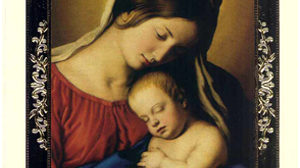Reflection:
Decorating the Christmas tree this holiday season has got me thinking. Have you ever reflected on the items we place on the top of our Christmas trees, as compared to the items we place beneath our trees? Many people put a star or an angel at the top of their tree. Underneath, people put presents, a nativity set, a train set, or perhaps a small village. We tend to put the things of heaven at the top of trees and the things of earth underneath them. It is almost as though the Christmas tree has this ability to connect us again. Symbolically, the tree unites the heavens and the earth. And the space in between we fill with ornaments, decorations and lights. These are all things which lift us beyond the hum-drums of daily routine. Many times the ornaments themselves are symbolic of family experiences.
Fascinating, for so many people these few days of Christmas actually change us. We change our schedules, our priorities, and we let go of productivities. We literally move into a different frame of time and in doing so the magic of reconnecting happens. We take time to connect and reconnect with family and friends. And suddenly, right there in our midst is the Prince of Peace. It’s delightful and miraculous how we actually live for a few days out of the truth of this connection. We afford ourselves time to tell sacred stories and to listen to how the one from heaven comes to us. And for a brief time, we find ourselves at one with God.
I noticed this year, that it really doesn’t matter how many unexpected people stop by. There’s always enough to go around; enough food, enough hospitality, enough laughter, and certainly enough stories. There’s enough for everyone. Mixed in with this is a sense of sharing in the blessedness of the season and never any worries of scarcity. Isn’t this the kingdom which Jesus proclaims? When I read today’s gospel, I read it from the satisfaction of this blessed Christmas season. Where some only saw scarcity and limitation, Jesus says there is enough for everyone, not just the 5000 men but also anyone else who would have showed up. Jesus looks beyond the smallness of a limited existence. He looks beyond what merely exists at the bottom of the tree to the abundance in that place where heaven and earth come together. He is able to take, bless, break, and give beyond the limitations of what his disciples see.
Two chapters later in Mark’s gospel Jesus challenges his disciples to reflect on this experience. He asks them specifically about the numbers to jog their memory and have them recall that it is more than a miraculous event. As we do the same thing today, we see the event begins with the mercy of Jesus seeing the crowd. He then spends time teaching them as if to get them to look beyond their mere existence. And as he begins to raise his eyes to heaven, I can’t help but think that those watching Jesus began to raise theirs too, if only to see what Jesus is seeing. And somehow that star, sitting at the top of the tree, shines light on that humble little place of our existence. I love GK Chesterton’s quote that logicians are seeking to get the heavens into their head, while the poet only asks to get his head into the heavens.
Fr. David Colhour, C.P. is the pastor of St. Agnes Parish in Louisville, Kentucky.








